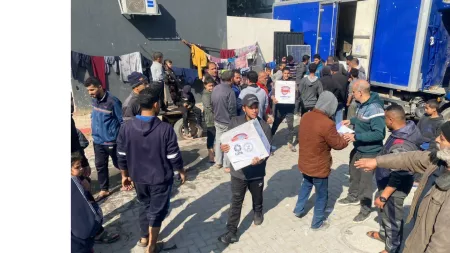One month after the killing of seven World Central Kitchen (WCK) staff, CARE and other six INGOs working in Gaza analyze the flow of humanitarian aid in the Strip:
The Israeli authorities have not implemented the pledged commitments they made on April 6, 2024, following the killing of seven World Central Kitchen (WCK) staff, to facilitate increased humanitarian access in the Gaza Strip. Humanitarian actors see no significant improvement from Israeli authorities in addressing the dire challenges to provide life-saving aid for Gaza’s 2.3 million residents, including those in northern Gaza who according to the World Food Programme’s (WFP) Executive Director Cindy McCain are living under a “full-blown famine.” The current situation is expected to deteriorate even further as Israeli forces issue “evacuation” orders to more than 100,000 civilians in parts of Rafah and should the Israeli military ground offensive on Rafah move forward. No aid entered Gaza through the Rafah crossing on May 5 and no aid entered Gaza through either Rafah or Kerem Shalom /Karam Abu Salem crossings on May 6, 2024.
The killing of seven World Central Kitchen (WCK) staff on April 1 brought significant attention to the extreme insecurity Palestinian and international aid workers and civilians alike have faced in Gaza since October 7. The WCK attack showed: no one is safe in Gaza. On April 6, following the outcry of Member States, the Government of Israel made seven commitments in a reported effort to increase humanitarian access into Gaza.
As humanitarian agencies with staff in Gaza working around the clock under impossible conditions, we note that the majority of the announced measures have not been implemented, nor has a timeline for implementation been announced. Even if fully met, the realization of these commitments alone would still not provide the conditions for safe, unhindered, principled humanitarian access. To roll back six months of starvation and the collapse of all services and infrastructure amid catastrophic conditions requires much more than mere logistical facilitation: what is needed is a massive flow of humanitarian aid and an immediate and sustained ceasefire.
Far from witnessing an improvement in access following Israel’s commitments, humanitarian actors are only expecting further challenges as Israel’s offensive on Rafah unfolds. Humanitarian agencies have warned this will result in an even more catastrophic scenario, including a devastating surge of civilian deaths, mass forcible displacement and severe deterioration of the operating environment of humanitarian actors.
Only an immediate, sustained ceasefire, full adherence to international humanitarian law (IHL), and the opening of all entry points to Gaza for humanitarian and commercial supplies, including for banking, will allow civilians’ basic human needs to be met. Israel, as the occupying power, bears the responsibility to provide or facilitate the provision of humanitarian relief for the protected population under its military occupation.
Methodology
The information outlined in this briefing note is sourced from two key areas: publicly available reports, including those from the United Nations, and insights gathered from the on-the-ground experiences of NGOs. By analyzing public data and connecting it to the seven commitments that were made by the Government of Israel, and by incorporating the ground-level observations and expertise of participating NGOs, this joint briefing note aims to clarify the realities on the ground for humanitarian access into and inside the Gaza Strip.
